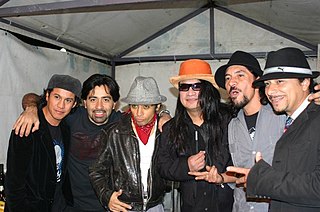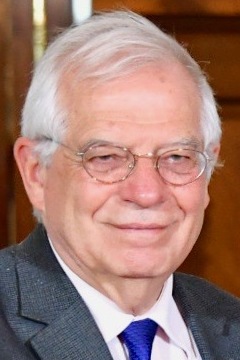
La Maldita Vecindad y los Hijos del Quinto Patio is a band formed in Mexico City in 1985. They are pioneers of rock en español and one of the most influential rock bands in Mexico.
Union, Progress and Democracy was a Spanish political party founded in September 2007 and dissolved in December 2020. It was a social-liberal party that rejected any form of nationalism, especially the separatist Basque and Catalan movements. The party was deeply pro-European and wanted the European Union to adopt a federal system without overlap between the European, national and regional governments. It also wanted to replace the State of Autonomies with a much more centralist, albeit still politically decentralized, unitary system as well as substituting a more proportional election law for the current one.

The 1994 European Parliament election in Spain was held on Sunday, 12 June 1994, as part of the EU-wide election to elect the 4th European Parliament. All 64 seats allocated to Spain as per the 1993 Council Decision amending the Direct Elections Act were up for election. The election was held simultaneously with a regional election in Andalusia.

The 2009 European Parliament election in Spain was held on Sunday, 7 June 2009, as part of the EU-wide election to elect the 7th European Parliament. All 50 seats allocated to Spain as per the Treaty of Nice—54 after the Treaty of Lisbon came into force on 1 December 2011—were up for election.
'Vecino' means either "neighbour" or resident in modern Spanish. Historically in the Spanish Empire it referred instead to a householder of considerable social position in a town or a city, and was similar to "freeman" or "freeholder."

The Centre for Political and Constitutional Studies, previously known as the Institute for Political Studies, is an autonomous agency associated with the Ministry for the Presidency of Spain.

Colonia Morelos is a colonia located just north of the historic center of Mexico City in the Cuauhtémoc borough. It has been a poor area since Aztec times, with many residents today living in large tenements called vecindades. The area, particularly the Tepito neighborhood, is known for crime, especially the sale of stolen merchandise and drugs. It is home to the very large Tepito tianguis or market, and also has two major places of worship dedicated to Santa Muerte.

Modesto Seara Vázquez was a Spanish-born Mexican jurist and academic. He lived in several countries but has spent most of his life in Mexico. He has actively participated in Mexican life as a professor at the National Autonomous University of Mexico and since 1988 as the Rector of the Oaxaca State University System in the State of Oaxaca. He died in Mexico City on 26 December 2022, at the age of 91.

The 2014 European Parliament election in Spain was held on Sunday, 25 May 2014, as part of the EU-wide election to elect the 8th European Parliament. All 54 seats allocated to Spain as per the Treaty of Lisbon were up for election.
The Revista Chilena de Historia del Derecho is a peer-reviewed academic journal covering legal history that is published by the University of Chile. It was established in 1959 and its subject matter are legal affairs which have become history; the editor-in-chief is Felipe Vicencio Eyzaguirre.

The 2019 European Parliament election in Spain was held on Sunday, 26 May 2019, as part of the EU-wide election to elect the 9th European Parliament. All 54 seats allocated to Spain as per the Treaty of Lisbon—59 after Brexit was formalized on 31 January 2020—were up for election. The election was held simultaneously with regional elections in twelve autonomous communities and local elections all throughout Spain.

Laura Nuño Gómez is a Spanish political scientist, researcher, and feminist activist. She is director of the Gender Studies Chair of the Institute of Public Law and the Gender Equality Observatory at King Juan Carlos University (URJC), as well as the creator of the first academic degree in Gender Studies in Spain, and of various postgraduate programs in this subject. She is the author of El mito del varón sustentador, as well as about 30 articles and books about her research. Since the enactment of the Law for Effective Equality of Women and Men, she has been one of the three expert members of the State Council for the Participation of Women.

María Eugenia Rodríguez Palop is a Spanish jurist, professor of Philosophy of Law at the Charles III University of Madrid (UC3M), specializing in human rights.

Coalition for a Solidary Europe is an electoral list of regionalist parties that was formed to contest the 2019 and 2024 European Parliament election in Spain. The list is the de facto successor of the Coalition for Europe that ran in the 2014 and 2009 elections. Is formed by the Basque Nationalist Party (EAJ/PNV), Canarian Coalition–Canarian Nationalist Party (CCa–PNC), Proposal for the Isles, Geroa Socialverdes and Atarrabia Taldea.

Santiago Muñoz Machado is a Spanish jurist and academic, director of the Royal Spanish Academy and the Association of Academies of the Spanish Language since 10 January 2019. As a jurist, he specialized in administrative and constitutional rights. He is also a member of the Royal Academy of Moral and Political Sciences and editor of the Diccionario del español jurídico and the Diccionario panhispánico del español jurídico.

Lina Gálvez Muñoz is a Spanish economic historian and politician, and member of the European Parliament since 2019. She was Minister of Knowledge, Research and University of the Regional Government of Andalusia from 2018 to 2019. She is an expert in feminist economics and member of Economists Without Borders.
The Joint Congress-Senate Committee for the European Union is a parliamentary committee of the Spanish Cortes Generales formed by members of the Congress of Deputies and the Senate. A natural evolution of the Joint Committee for the European Communities, the Joint Committee for the European Union is devoted to the participation of the Parliament on EU affairs, obtaining information in order to have influence on the stance of the Government. Since its launch, its functions were expanded after the signing of the Treaty of Lisbon through the Law 24/2009, of 22 December 2009 and the Law 38/2010, of 20 December 2010, modifying the original Law 8/1994.

The 2024 European Parliament election in Spain was held on Sunday, 9 June 2024, as part of the EU-wide election to elect the 10th European Parliament. All 61 seats allocated to Spain as per the Treaty of Lisbon and the 2023 Council Decision establishing the composition of the European Parliament were up for election.

The Tenants' Strike or Broom Strike of 1907 was a popular movement against the rise in rents in tenant houses in the city of Buenos Aires and other Argentine cities, popularly called conventillos. The strike began in August 1907, it lasted approximately 3 months and more than one hundred tenants participated in the movement, with thirty-two thousand workers on strike. It had a significant presence of anarchist and socialist activists.

Michael Espinoza Coila is a peruvian lawyer, university professor, human rights activist and catechist, dedicating himself to Criminology and information technology (ICT). He is known for developing the principle-law-procedure of the best interests of the student, is also a university student law activist.
















